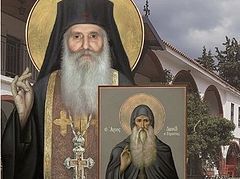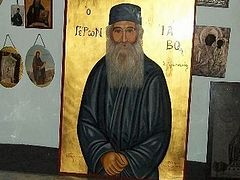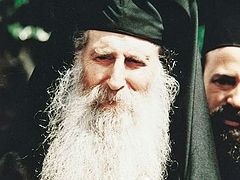Elder Iakovos was the first to kiss my hand
We were driving to the Monastery of St. David in Evia to see Elder Iakovos, but we ran into him along the way. He told us he was going to commune someone and then he’d return to the holy monastery. We got to the monastery and waited for him to get back.
As we were venerating the icons in the church, the altar door opened and out came Elder Iakovos. He greeted us. I was shocked. We saw him on the road just a little bit ago, and the distance to commune the dying person and get back to the monastery should have taken him at least an hour. I said:
“Geronda, forgive me!”
“Yes, my child!”
“Didn’t we just see you going down the road?”
“Yes, my child.”
“Weren’t you going to commune someone lying on his deathbed?”
“Yes, my child.”
“You already went to commune him?”
“Yes, my child.”
“How’d you do it so fast?”
“My child, this is God’s work!” the Elder replied and left.
During my first encounter with Elder Iakovos, I received a spiritual experience. After we got to the monastery, we had a slight misunderstanding, because I, then a young deacon, went to kiss his hand, but he took my hand and wanted to kiss it first.
“But Geronda, I’m just a deacon!”
I was surprised by the strength with which he took my hand. I couldn’t do anything. First he kissed my hand, then I kissed his hand, and he told me:
“Now you’re a good monk, because you’ve shown obedience.”
This was my first communication with him, the beginning of a close relationship with him for twenty years. I don’t know if I knew him well, but I started understanding the meaning of the word “saint,” which we often hear and ask ourselves:
“Who is a saint?”
It means the Lord vouchsafed me to see a living saint, a true man of God who lived with God.
What do we say in the Divine Liturgy? “Holy Things are for the Holy.” And how do we respond? “One is Holy, One is Lord: Jesus Christ, to the glory of God the Father.” But if only one, Christ, is holy, then why do we say “St. [Holy] Demetrios?” The question is whether a man can be in communion with God. The Lord was the first to commune with man when He took on our human nature and came into our world. When God united with us, He gave us His grace, this unity of man and God in the Person of Christ that is the salvation of man and the opportunity to unite with God.
I saw this theology of the Church before me; I saw it in a man, because only a saint has this charisma to testify and affirm it: Yes, God became Man; yes, man can become God; yes, Christ crucified Himself and condemned my sin in His flesh; yes, Christ rose again, defeating my death and leading me into His Kingdom; yes, Christ ascended and took me back to where I started my journey, to the Kingdom of God. Indeed, all of this can be mine because He sent the Holy Spirit to give us this whole life. All of these truths are lived in the Church; I’ve already seen and explored them in the person of one man.
Elder Iakovos would ask forgiveness even for talking to you
Another thing I noted during my first visit to the monastery were the four words he kept saying: “Forgive me! Forgive me!” Elder Iakovos would ask forgiveness even for talking to you. Such was his humility. I’ll never forget how I, as a very young monk, went with our venerable elder, the recently reposed abbot of Grigoriou Monastery Fr. George (Kapsanis), on a pilgrimage to the Church of St. John the Russian in Neo Prokopi and to the Monastery of St. David. Our elder, Fr. George, asked him with great respect and love:
“Geronda, will you come see us on Mt. Athos, to bless us?”
But Elder Iakovos replied:
“Who? Me? I’m a stinking dog, polluting the very air. What would I do there?”
This really made a strong impression on us, because it wasn’t just some sort of humility in words that we’re used to saying easily—he had true humility.
Over the course of all these years, I was convinced that this was a man of true faith before me. What kind of faith? Not that kind of faith we’re thinking of. According to the criteria of Elder Iakovos, the majority of us are non-believers. To believe means to trust. Who? The Person and word of God. He had such faith.
As we say in the Divine Liturgy: “Let us commit … all our life unto Christ our God”—this was his life. He entrusted everything to God. He turned trials, temptations, and sicknesses into prayer and entrusted them to God from the very moment when St. David received him into the monastery. After completing his military service, one evening Elder Iakovos walked from the village where he lived to the holy monastery to venerate St. David. The monastery gates were closed, but a monk opened them to him and he went in and went to the church. There were two monks in the monastery that day. One of them was standing by the church door, fixing something. Having seen Elder Iakovos, he looked at him attentively and said:
“How did you get into the monastery? Who opened the gate for you?”
“A monk!”
But the second monk was sleeping at that time. The monk marveled. He went to check whether the other monk had really woken up and opened the gates to a pilgrim. But he was still sleeping.
“Who opened the door for you, my child?”
“A monk opened the gates for me.”
 Sts. David and Iakovos of Evia Elder Iakovos went into the church to venerate the icon of St. David, and as soon as he approached the saint’s icon, the pilgrim saw his image and said in surprise to the monk:
Sts. David and Iakovos of Evia Elder Iakovos went into the church to venerate the icon of St. David, and as soon as he approached the saint’s icon, the pilgrim saw his image and said in surprise to the monk:
“He’s the one who opened the gate for me!”
St. David opened the gate of the holy monastery for him, receiving his blessed and sanctified heir.
His weapon was prayer, which was a natural fruit of this trust, because prayer is the surrender of our lives to God. We pray not because the Lord doesn’t know our problems—prayer is a thermometer measuring the degree of our faith. If you trust God, you’ll communicate with Him. If prayer is burdensome for you, it means God is just a name for you.
But for Elder Iakovos, God was a Person Whom he trusted, Whom he prayed to; he turned all his problems and those of others into prayer to God. There was always a pile of letters on the table in his cell that he was answering. But he answered the majority of them with his prayer, and when he prayerfully entrusted someone into the hands of God’s love, he found peace. But the Lord Himself intervened in people’s lives.
Let’s take a look at some miraculous events. When I was in school, I heard that Elder Iakovos had a very difficult operation. The operation really was difficult, and the doctor who examined him told him he should have died a long time ago, considering the problems he had. Elder Iakovos didn’t dare go to the doctors, so that they wouldn’t look at his naked body. It was a shame for him.
“I’m going to a doctor’s appointment and I’m committing fornication,” he said to me.
I objected:
“Geronda, you go to a doctor so he can examine you.”
“No, my child, it’s something different for us.”
When they told him there were no other options and he had to have the surgery, he said:
“I thought, my child, that when performing an operation on me, the surgeon would only make an incision on me.”
When Elder Iakovos was in the hospital, he prayed, “St. David, if you want me to return again to your monastery, come and heal me! And if you come, go to Neo Prokopi and bring St. John the Warrior (the Russian) with you.”
“I thought, my child, that the saints walk just like we do,” he told me.
 Sts. David and Iakovos of Evia and St. John the Russian
Sts. David and Iakovos of Evia and St. John the Russian
At some point, the door to his room opened, and he saw two faces: the face of St. John the Russian and the face of the venerable Elder David, who said to him:
“How are you, Father? What are you doing?”
“Well, what can I do, Geronda? I’m supposed to have surgery. But I’m afraid!”
“Don’t be afraid! You’ll get better. We’re the ones you called for. I’m Elder David, and this is Righteous John the confessor. Didn’t you summon us? We’ve come. Don’t worry about anything!”
They left.
On the day of the operation, they took him to the operating room to give him anesthesia. As Elder Iakovos was lying on the operating table, he saw the door open and two saints come in.
“Ah, and here are the holy fathers.”
Other monks, who were in the hallway near the operating room, said:
“Fr. Iakovos is starting to feel light-headed from the anesthesia and he thinks he’s seeing saints.”
But he heard them and said:
“I’m not imagining it—I really see them.”
The surgery was successful. If you were to give Elder Iakovos a glass of water, he’d remember it for twenty years. He also spoke about the doctor who operated on him in a warm and loving way:
“May God grant good health to the doctor who operated on me! May God grant him health and all good things!”
One day he had a vision of St. John the Russian, who told him:
“Fr. Iakovos, I heard you saying: ‘May God give the doctors good health!’ Yes, he’s a very good surgeon, but I was guiding his hand. You should have died today, but your death was postponed until tomorrow.”
And thank God, this “tomorrow” didn’t come for forty years.
Elder Iakovos became akin to the saints
He could talk with them, beg them, and after a little while, he even could even argue with them a bit.
One day, Elder Iakovos told me about how the Most Holy Theotokos appeared in the hospital:
I was amazed, my child! There was a nurse hugging a child. I said to myself: “Do nurses really bring their children here?”
She asked me what I was doing, and I answered her. The nurse told me: “Don’t worry! You’ll return to the monastery soon!”
After that, she left. I turned to the man on the other bed and asked him: “Who was that woman?”
“What woman?” he asked in response.
“That nurse, with the baby? Do nurses really bring their children here?”
He replied: “I didn’t see any woman or any baby.”
It was no ordinary woman with a child—it was the Most Holy Theotokos with the Christ Child.
Elder Iakovos remembered for many years that I once visited him when he was in the hospital. He would say:
“Fr. Paul came to see me in the hospital.”
As I said above, his boldness with the saints sometimes led him to quarrel with them. One day some news came. Over the night, someone had cut down thirty olive trees in the monastery garden. Fr. Iakovos was very upset when he found out about it. He went to the church, venerated the icon of St. David, and said to him:
“Geronda, I gave up everything to serve you! Don’t you even take care of your garden? If you don’t bring the person who cut down the olive trees to me by evening, then I won’t cense your icon anymore!”
That evening, shortly before the start of Vespers, someone knocked on the door. In walked a man well known in that area, who asked to speak with Elder Iakovos. As soon as the Elder saw him, he said:
“Fr. Iakovos, I cut down the trees.”
“Why did you do it, my child?”
“Are you going to call the police?”
“No, I’m not going to call the police, but why did you cut them down? You might say to me, ‘Why does a saint need olives?’ Of course we need them! Do you know, my child, how many people the monastery gives olive oil to every year?”
Because he cared not only about the holy monastery, but also about other people.
A living experience of God’s grace
I personally witnessed another case. I was visiting Mantoudi, a village on the island of Evia in Greece, where I had a very good relationship with the teachers at the local school. I had also taught there for a while. Everything was going fine, but there was a misunderstanding on the very last day of the school year. At noon I went to my cell, not far from a teacher’s house where all the teachers usually got together. I decided to go visit them. As soon as I went in, I saw there was a real commotion. The teachers started telling me various things and finally asked me:
“What do you say?”
“Me?”
“Yes.”
“What are you doing tonight?”
“What can I do today?”
“Do you have anything to do tonight?”
“No.”
“Then let’s drive to St. David’s Monastery.”
 The Monastery of St. David of Evia
The Monastery of St. David of Evia
So we went to the monastery. There were eight of us. We venerated the icons in the monastery church. Then we sat down on a bench in the courtyard, and after a while, the abbot, the now-reposed Fr. Kirillos, invited us with a smile:
“Let’s have a cup of coffee!”
“Okay, Father.”
He brought us coffee. While we were drinking it, Elder Iakovos came. Everyone stood up, greeted him, and took his blessing.
I told him:
“Geronda, since this is the first time for some of us to visit the monastery, can you tell us about St. David and about the monastery?”
“Yes, yes, Father! Fr. Paul always brings good people to the monastery!”
He started telling them about St. David and the monastery, and at some point started telling them about everything that had happened between them. The teachers were amazed and turned and looked at me. It was as if they were asking me:
“When did you have time to tell the Elder about us?”
I smiled. I hadn’t told them anything about the teachers. Elder Iakovos told them what he had to tell them. At the end, he asked me:
“Father, are you going to stay for dinner in the trapeza?”
“No, Geronda, we’re not staying. We’ll stay for Vespers, then we’re going to go.”
“No! No! Stay for the evening meal! I’ll go tell Fr. Kirillos to make sure dinner is prepared in the trapeza.”
When he left, the teachers rushed to me. I told them:
“People, please, just remember that from the time I came to your house, I haven’t been away from you for a minute!”
There were no cell phones then. When they realized what had happened, their lives changed that day for most of them. Why? Because they had received a living experience of God’s grace. They saw that it wasn’t just words, but reality. It’s very important to meet a saint who considers himself the greatest sinner on earth.





